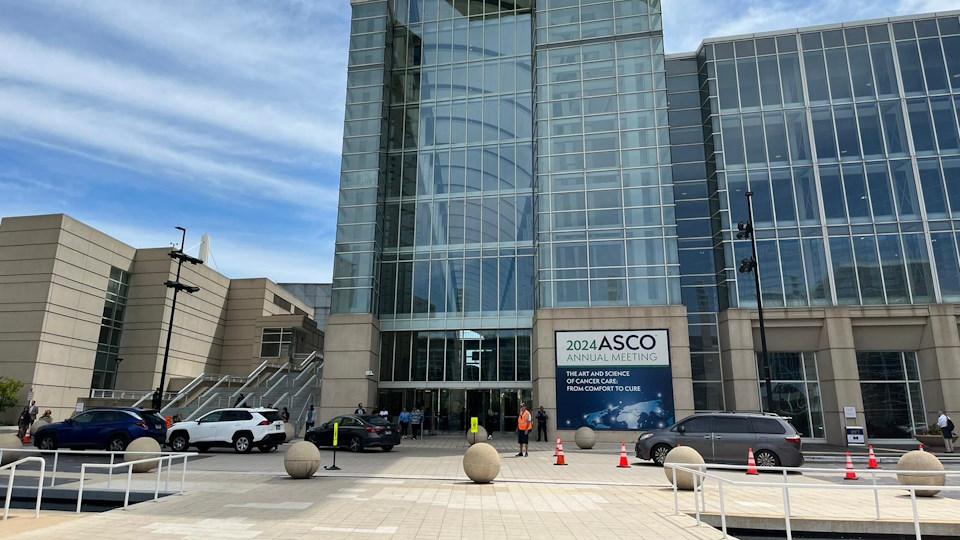ASCO: AstraZeneca’s triple whammy in lung and breast cancer

Two impressive studies in lung cancer and another in breast cancer made Sunday a stellar day for AstraZeneca at the ASCO congress.
Three of the group’s top cancer drugs were on display – EGFR inhibitor Tagrisso (osimertinib), PD-L1 inhibitor Imfinzi (durvalumab), and Daiichi Sankyo-partnered HER2 antibody-drug conjugate (ADC) Enhertu (trastuzumab deruxtecan) – with new data that could expand their use and drive sales.
First up, Tagrisso, which is already AZ’s second-best-selling drug with sales of $5.8 billion last year. New data from the LAURA trial in unresectable stage III EGFR-mutated non-small cell lung cancer (NSCLC) previously treated with chemoradiotherapy (CRT) showed that compared to placebo, Tagrisso reduced the risk of disease progression or death by 84%.
Median progression-free survival (PFS) was dramatically longer at 39 months in the Tagrisso group and just under six months with placebo, and there was also a trend towards improved overall survival, although the data on this are not mature.
Three-quarters (74%) of Tagrisso-treated subjects did not have any cancer growth after 12 months, compared to 22% of the placebo group, while at 24 months, the rate was 65% and 13%, respectively.
ASCO commentator David Spigel of Sarah Cannon Research Institute in Nashville, US, said the data suggest Tagrisso could become the “standard of care” for this group of patients. At the moment, there are no targeted cancer drugs approved to treat unresectable stage 3 NSCLC, which has a very high rate of recurrence.
Spigel noted that the trial did not compare Tagrisso with the current standard of care immunotherapy for unresectable stage 3 NSCLC – Imfinzi – but that treatment is generally not effective for patients with EGFR mutations.
Turning to $4 billion blockbuster Imfinzi, the ADRIATIC study looks set to unlock the use of immunotherapy in limited-stage small cell lung cancer (SCLC), extending its use from the extensive-stage SCLC setting where the disease has already metastasised.
That is particularly notable as treatment for LS-SCLC has remained largely unchanged since the 1980s, and around a third of all SCLC diagnoses are made at this stage. The five-year survival rate for LS-SCLC is between 18% and 30%.
The top-line finding is that consolidation treatment with Imfinzi after CRT helped patients with LS-SCLC live 27% longer when compared to placebo on top of standard care. Median OS was 56 months with the PD-L1 inhibitor versus 33 months with placebo, while PFS came in at 17 months and 9 months, respectively.
After three years, 57% of patients taking Imfinzi were still alive, compared to 47% of the placebo group, making Imfinzi the first and only immunotherapy to show a survival benefit in LS-SCLC and a “curative intent”, according to AZ, which says it aims to file for approval of the new indication as quickly as possible.
Finally, for its ASCO ‘Super Sunday’ hat trick, AZ and Daiichi Sankyo reported results from the DESTINY-Breast06 trial, which could extend the reach of antibody-drug conjugate (ADC) Enhertu in breast cancer with even lower levels of biomarker HER2.
The trial enrolled patients whose tumours were HR-positive and either HER2-low or HER2-ultralow who had previously been treated with one or more lines of endocrine therapy, and showed a significant 38% improvement in PFS compared to standard-of-care chemotherapy.
The benefit was seen in both HER2-low and HER2-ultralow patients and, according to lead study investigator Giuseppe Curigliano of the European Institute of Oncology, IRCCS in Italy,” show that Enhertu could become a new standard of care for patients with HER2-low- and HER2-ultralow-expressing tumours following endocrine therapy in the metastatic setting.”
Enhertu is already approved by the FDA for patients with HR+, HER2-low breast cancer after endocrine therapy, but the new data could make it an option for even more patients. Currently, around two-thirds of patients who would previously have been classified as HER2-negative classed as HER2-low on testing, and including the ultralow group could make 90% or more of them eligible for treatment.
ASCO commentator Erica Mayer of Dana-Farber Cancer Institute in Boston, US, said the results support Enhertu as a “preferred first-line treatment option for most patients” after endocrine therapy, but cautioned that treatment resulted in more serious toxicities compared to traditional chemotherapy.
The drug “may not be the right choice for every patient,” she remarked.
Enhertu is already a blockbuster, with sales doubling to around $2.5 billion last year, and could see its momentum gather even further after being approved for all HER2-positive solid tumours, regardless of type, by the FDA in April.
pharmaphorum sat down with AstraZeneca SVP and Head of Oncology Mohit Manrao right before the conference to talk about the company’s stellar ASCO and much more. Check it out in the video below.













